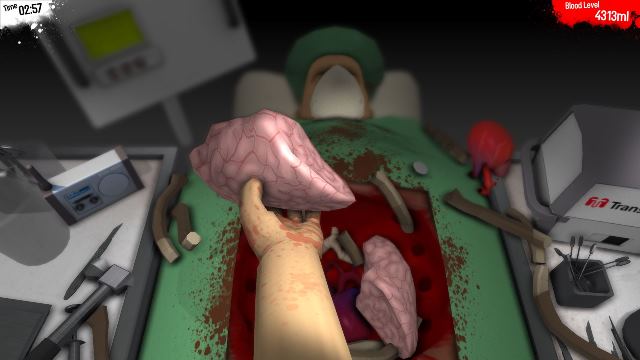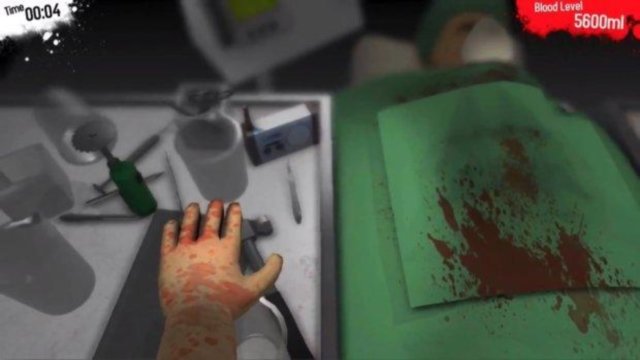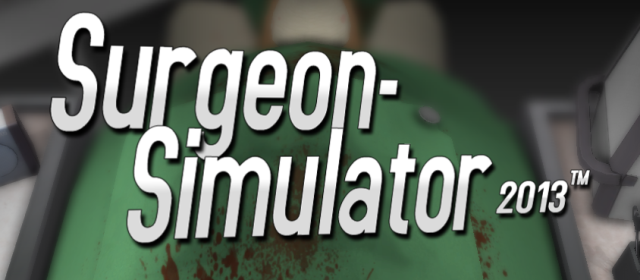What do you get when you put several British game designers together in a room with only forty-eight hours to create a new and interesting video game? Apparently, you get Surgeon Simulator. The small team at Bossa Studios put out their own “interesting” take on Heart surgery at the last Global Game Jam and since that time it has acquired somewhat of a cult following.
Originally released as a free-to-play browser-based game after its short, forty-eight hour gestation period, it has now been given the go-ahead by Steam Greenlight for release on said gaming platform, complete with the snazzy new Surgeon Simulator 2013 title.
Firstly, for those who are uninitiated in the ways of the Surgical Simulator, the game plays thus: you control Dr. Nigel Burke, who seemingly has never performed any kind of surgery before and has little to no skill in the field. In fact, the man is a complete oaf, for whom even simple motor skills are difficult. This is all because the game is controlled in the same way as web-browser classic QWOP. In the same way in which players used their keyboard to control a runner’s leg muscles in that game, you control the fingers of the left hand of Dr Burke in Surgeon Simulator. For instance, letters Q, W, E, R and the space bar control all four fingers and thumb, making them open and close, whilst the mouse is used to move the hand around the screen. The mouse buttons also lower or twist the hand.

You are tasked with different operations to perform – such as heart or brain surgery – without the patient losing too much blood. His blood meter will slowly go down throughout even a successful operation, but make certain mistakes and the rate of blood-loss will increase – leaving you only precious seconds to complete your operation. Most levels will see you first having to gain access to the organ in question, then removing it and replacing it with a new, better one. This normally will lead you to smashing your way through a rib cage or skull, to expose the organ beneath.
One of the main differences that players will notice is that there has been a big graphical overhaul, with textures of a much higher resolution on display and a lot of little touches added to the environment. The game certainly looks a lot better, and justifies the Steam release in that respect. There is also the addition of an interactive menu screen – which is designed to look like a doctor’s reception – which has lots of Easter eggs to play around with, and acts as a hub to access all of the different surgeries, options and achievements. There is a lot of new content on offer here that wasn’t previously available, even some in-ambulance bonus surgeries that add an extra dimension to the gameplay.

As the controls are similar to QWOP, both games are also very difficult to control, and in this title even picking up an empty beaker is a really challenging task. You can only move two fingers at a time, so rather than being able to grab a bonesaw with your whole hand – for instance – you perhaps have to pick it up daintily with your thumb and forefinger only. This leads to all sorts of crazy grips on objects, and of course makes many actions in the game very difficult. You will more-often-than-not find that instead of grabbing the implements you need, you have instead knocked them all on the floor and will have to re-start. And then when you do grab a tool, it is very likely that you won’t be able to control it properly and will cause irreparable damage to the patient.
This is all very amusing though, it must be said – and there are few funnier scenes than smashing open a man’s skull with a hammer, before frantically yanking at the brain inside, hoping to pull it loose. And when a mission goes horribly wrong, it can be hilarious to see a runaway electric drill flipping all over the operation room whilst the body cavity of the patient fills up with scalpels and all sorts of discarded medical paraphernalia and Dr Burke slaps the patient with one of his own lungs. You can handle each surgery in the way you want to, and you can complete them as cleanly or as messily as you can manage. You could have a lot of laughs with the game.
Unfortunately though, the control system – whilst inventive – is far too fiddly in practice. And the strange thing is that the controls in the simpler, web-based version of the game seemed a lot more responsive and fluid. They are a lot more sensitive and allow for larger, more energetic movements that also help to make the web-based version a lot funnier. In Surgeon Simulator on Steam, the controls feel too sluggish and laboured, making the comic hammer-bashing a lot less fun, and not allowing nearly as much potential for flinging organs all over the room.

The extra operations that have been added to the game and all of the improvements would be great for fans of the original who want some new content to play through, but the title isn’t as instantly accessible or even as playable as the previous version. It still remains a fun premise, and experimenting with the range of implements on offer is exciting – but the controls just don’t feel as good and aren’t as user friendly as the prototype – and some of the humour has definitely been lost in translation.
VERDICT: Surgeon Simulator 2013 was a perfect browser based game – a simple idea, implemented in an ingenious way, that was fun to play. A retail version of the title just didn’t seem necessary, and it hasn’t delivered anything to prove that assumption wrong. This isn’t a flatliner, but there may be some sort of malpractice case to address here.

AVERAGE. The epitome of a 50/50 game, this title will be unspectacular but inoffensive, charmless but amiable. We aren’t condemning a game by scoring it a 5, but we certainly aren’t championing it, either.







